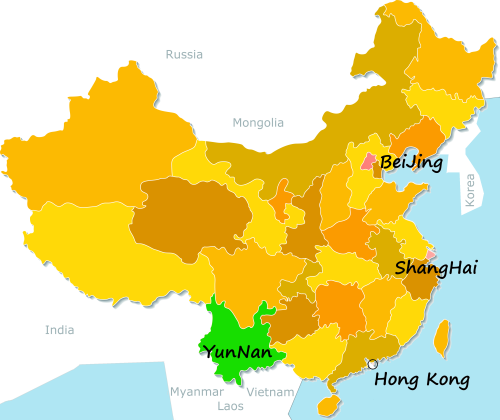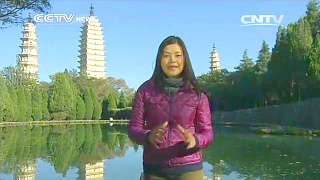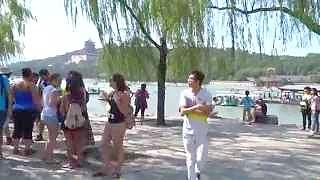With Walk China ...
[640],shadow=true,start=,stop=Introduction
ShuangLang ancient town is a charming and picturesque village located on the eastern shore of ErHai Lake, DaLi, Yunnan province. Known for its tranquil lakeside scenery, traditional Bai architecture, and vibrant arts scene, Shuanglang is an ideal destination for those looking to experience the natural beauty and cultural richness of the region.
Getting There
- By Air: The nearest airport is Dali Airport (DLU). From the airport, you can take a bus or hire a taxi to Shuanglang, which is about 50 km away.
- By Train: The nearest major train station is in Dali. From Dali, you can take a bus or taxi to Shuanglang, which takes about an hour.
- By Bus: Direct buses run from Dali Ancient Town to Shuanglang, providing a convenient and scenic route along Erhai Lake.
Best Time to Visit
The best time to visit Shuanglang is during the spring (March to May) and autumn (September to November) when the weather is mild and pleasant. Summers can be hot and rainy, while winters are cooler but still enjoyable for sightseeing.
Main Attractions
- Erhai Lake: Shuanglang is situated on the shores of Erhai Lake, offering stunning views and opportunities for boating, cycling, and lakeside walks.
- Moon Palace: A popular landmark in Shuanglang, the Moon Palace is known for its beautiful architecture and panoramic views of Erhai Lake.
- Yuji Island: Accessible by boat, this small island is home to a variety of art galleries, cafes, and boutique shops, making it a great spot for a day trip.
- Jinsuo Island: Another nearby island worth visiting, known for its traditional Bai village and tranquil atmosphere.
- Benzhu Temple: A historic temple dedicated to local deities, providing insight into the spiritual and cultural heritage of the Bai people.
Cultural Highlights
- Bai Ethnic Culture: Shuanglang is predominantly inhabited by the Bai ethnic group. Explore their unique customs, traditional Bai houses, and vibrant festivals.
- Art and Craft: Shuanglang is known for its thriving arts scene. Visit local art galleries, workshops, and boutiques to see the work of local artists and artisans.
- Local Festivals: Experience traditional Bai festivals such as the Third Month Fair and the Torch Festival, which feature music, dance, and local cuisine.
Accommodation
Shuanglang offers a range of accommodation options, from luxury boutique hotels to budget-friendly guesthouses. Some recommended places to stay include:
- Sky Valley Heritage Boutique Hotel: A luxury hotel offering stunning views of Erhai Lake and elegant, traditionally designed rooms.
- Sea & Moon Inn: A mid-range hotel with comfortable rooms and a beautiful lakeside location.
- Shuanglang Daxie Homestay: A budget-friendly guesthouse providing a cozy and authentic experience of local hospitality.
Dining
- Local Cuisine: Shuanglang is known for its fresh lake fish, traditional Bai dishes, and local specialties. Don't miss trying Erhai Lake fish hotpot, Bai-style grilled fish, and various wild mushroom dishes.
- Restaurants: Recommended eateries include Spring of Small Town, Qingyu Restaurant, and Yixiangxuan Restaurant.
Conclusion
Shuanglang Ancient Town offers a serene and culturally enriching travel experience. Whether you're exploring the scenic shores of Erhai Lake, delving into the rich Bai culture, or simply relaxing in a lakeside café, Shuanglang promises a memorable and peaceful retreat.
Dali, located in Yunnan Province in southwestern China, is a charming and culturally rich destination that attracts visitors with its stunning natural scenery, ancient history, and vibrant local culture. Here's a guide for visitors to Dali:
Historical and Cultural Significance:
Ancient City: Dali Ancient City, also known as Dali Old Town, is a well-preserved historical town that dates back over 1,000 years. It served as the capital of the Kingdom of Dali during the Tang Dynasty and later as an important trading post on the ancient Tea Horse Road.
Bai Minority Culture: Dali is home to the Bai ethnic minority, whose unique culture and traditions are evident throughout the region. Visitors can explore Bai villages, interact with locals, and learn about their traditional customs, architecture, and craftsmanship.
Top Attractions:
Erhai Lake: One of Dali's most iconic natural attractions is Erhai Lake, a vast freshwater lake surrounded by picturesque landscapes. Visitors can take boat cruises on the lake, cycle along its shores, or hike to viewpoints for panoramic views of the water and surrounding mountains.
Three Pagodas of Chongsheng Temple: Located just outside Dali Ancient City, the Three Pagodas are iconic symbols of the region and date back to the Tang Dynasty. The pagodas are set against the backdrop of Cangshan Mountain and are surrounded by lush gardens and temples.
Cangshan Mountain: Cangshan Mountain is a scenic mountain range that towers over Dali and offers numerous hiking trails, scenic viewpoints, and opportunities for outdoor adventure. Visitors can hike to waterfalls, explore alpine meadows, and enjoy panoramic views of the valley below.
Xizhou Ancient Town: Xizhou Ancient Town is another well-preserved historical town near Dali, known for its traditional Bai architecture, historic courtyards, and vibrant market streets. Visitors can wander through the town's narrow alleyways, visit ancient temples, and sample local delicacies.
Cultural Experiences:
Bai Architecture: Explore the distinctive Bai architecture found throughout Dali, characterized by white-washed walls, gray tiled roofs, and intricately carved wooden decorations. Visitors can tour traditional Bai homes, visit ancient temples, and learn about local building techniques.
Cultural Performances: Experience traditional Bai music, dance, and theater performances at local venues and cultural centers in Dali. These performances often showcase traditional costumes, musical instruments, and storytelling techniques unique to the Bai culture.
Practical Tips:
Weather: Dali enjoys a mild climate year-round, but the best time to visit is during the spring (March to May) and autumn (September to November) when the weather is most pleasant and the landscapes are lush and green.
Transportation: Getting around Dali is convenient with its network of buses, taxis, and bicycles. Many attractions are within walking distance of Dali Ancient City, while others can be reached by public transportation or organized tours.
Accommodation: Dali offers a range of accommodation options, including boutique hotels, guesthouses, and traditional courtyard homes. Staying in Dali Ancient City allows visitors to immerse themselves in the town's historic atmosphere and vibrant culture.
Dali offers a captivating blend of natural beauty, cultural heritage, and traditional charm, making it an enchanting destination for visitors seeking to explore the treasures of Yunnan Province. Whether hiking in the mountains, wandering through ancient towns, or immersing oneself in local culture, Dali has something to offer for every traveler.

 The beautiful ShuangLang ancient town, ErHai Lake, DaLi, YunNan province
The beautiful ShuangLang ancient town, ErHai Lake, DaLi, YunNan province




























